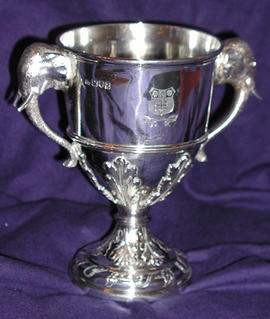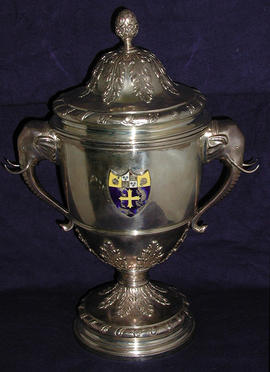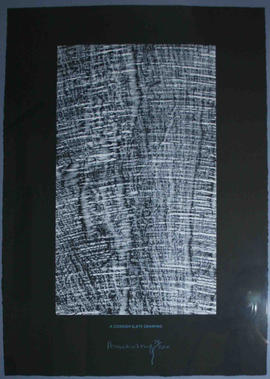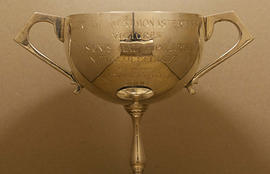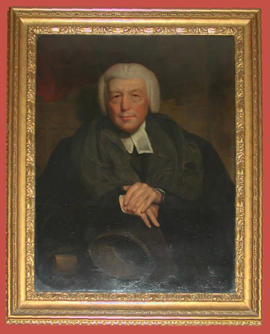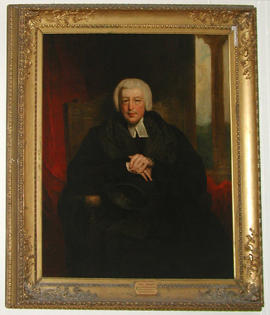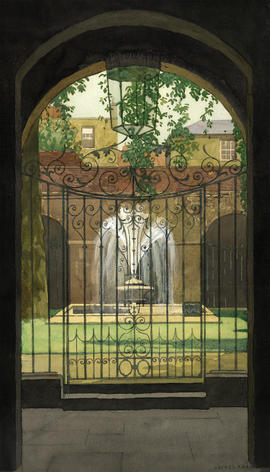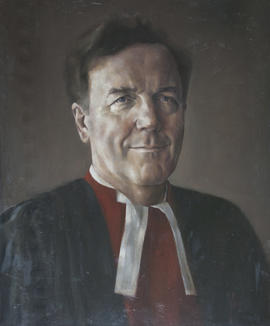Donated by Francisco Michaeli Yglesias. Not loaded. No cover. Elephant head handles
Lambert, Herbert Charles, 1852-early 20th CenturyA similar silver cup to T.0005.001 of smaller size, with an applied shield bearing the arms of Westminster School enamelled in colour, marked Sterling Silver, on foot. Enamels chipped.
Numbered 10 of an edition of 200. Indistinctly signed.
Long, Richard, 1945-Purchased by Eddie Smith and is owned by the Common Room at Westminster School. The trophy is given to the winners of the croquet match between the School and Westminster Abbey and is kept by the winners for a year. The inscriptions are: 'Collegium Westmonasteriensium Victores Lusionis Malleipilaris Intracollegiatae ex dono Sanctuarii Curatoris 2006' and '2006 Abbatia', '2007 Schola', '2008 Abbatia', '2009 Schola'. The School retained the trophy in 2010 but, at time of cataloguing (12 October 2010), this had yet to be engraved.
Three-quarter length, seated, wearing academic dress Oil on canvas
Three-quarters length portrait of Jackson seated in a chair, full face, wearing black academic dress and collar; his hands are clasped; to the left is red drapery and to the right a pillar supporting springers of a late perpendicular style.
Born in London, parents divorced when she was five. Lived with her grandparents and then her father. First Secondary school was Queen’s College. Father urged her to apply to Westminster. She did not love the all-girl environment of Queen’s College [2:15]. Did not know much about Westminster before arriving. Quite naïve, only fifteen, not as mature. Good for ego as there were fewer girls, girls got a lot of attention and were more mature than the boys [4:37]. Felt that there were lots of rules at Westminster compared to her secondary school, which was quite relaxed. Was in Ashburnham house with her brother. School on Saturday mornings [7:37]. Took Greek, found that literature was fine, but the boys were better than her. There were eccentric teachers. At Queen’s College, was the most academic and found Westminster promoted a nature of competition, particularly among other girls [10:00]. A-levels in Greek, Russian (one year), History in the first year. Did English in one year. Russian teaching was ok, English and History teaching very good. Taught English by Rory Stewart and Richard Jacobs [14:20]. Went on the study History at university. Westminster was a great preparation for university. Sent daughters here [16:30]. PHAB. Very interesting, not completely frictionless environment. Felt that they got more out of it [19:54]. Traditions; Abbey every morning, Latin prayers, the Greaze. Not a sporty environment. Went to primary schools in Wandsworth and took the children out for the afternoon. Found that people often did what their friends wanted to do. Put on two plays and acted in them [24:11]. Took part in production and directed a play in the first year. Did a talent contest and was in the Latin Play and the choir. Joined in on a lot, felt she wanted attention. The environment of Westminster encouraged doing a lot of activities all the time. Never felt threatened by boys maybe because there were fewer girls or because they were exposed to less. Girls now feel more threatened by male presence. Could have had these experiences but did not notice them at the time. Female solidarity, the Head Master’s wife used to invite the girls for tea. Only one female teacher. Girls did not wear uniform, but boys did. Difficult to police what the girl’s wore [33.43]. Food always revolting. Not a lot of bullying. Some boys were gay and were out about this, the school was accepting. Still transitioning from being a school all about boys, to a school where girls were being integrated, took a long time. Her sister attended in the 80s [37:49]. Everyone’s Invited has potentially changed the perception of the school. Social media has massively influenced the differences of her experiences compared to her daughters. Always being in the male gaze did not feel unpleasant but her daughters found this to be different. Young men now more threatened by girls as they feel the girls have an unfair advantage and these young, privileged men will not have the same opportunities as they used to. Liked how it was anti-authority when she attended, now has probably changed due to expenses, not everyone’s parents used to be super rich [43:18]. Drugs at Westminster; a few boys got expelled for this, not considered particularly cool, did not get much excitement from it. A lot of the teachers were older so a lot of them did not have the same upbringings surrounding drugs. Probably more liberal than it is now [46:57]. John Rae taught her history, was always at the Latin Prayers, and was very much a presence in the school. He was quite progressive (introduced girls for example) [48:47]. She was in a documentary. No duty of care. A lot of people had seen it. Asked invasive questions [53:12]. Had a lot of fun at Westminster, learnt a lot, pleased with herself, social and romantic memories. Must have been times where she was unhappy, falling in love, constantly being observed, working hard. Felt that she thrived in this environment. Father felt the documentary was shedding light on her being in an area that had not been gentrified [56:30]. Felt that for girls it helped if you were pretty and confident and not intimidated by the boys and the Masters. Could not imagine boarding there and being constantly at school. A lot of male admiration that felt great at the time [58:10]. After Westminster, felt that the school was brilliant in placing her in a job afterward. You instantly have connections which is very elitist but does help majorly. Feels slightly differently now due to the class divide in education. Felt very lucky to come to Westminster and was glad not to stay at Queen’s College. Felt she made the most of the experience despite it breeding a particular arrogance. When going off to work at the BBC, she realised that life is not actually like this, and people do not realise how lucky you are. Felt that Westminster was a bubble, when going into the workforce realised the existence of sexism, and that privilege was sometimes not an asset. Felt politically detached [01:02:39]. Believed John Rae did his best, and the elitism is not the school’s fault. Wanted her children to have the same experience she had. Need to be a certain type of child to attend Westminster. Feels like Westminster is a very tolerant place [01:06:02]. In the future, feels that schools like Westminster will have to work harder to broaden the social mix of the school. Thinks that it would be a shame to abolish these schools. Shocking that bright kids cannot get into Westminster due to money and blocks their opportunities [01:08:04]. Not very socio-economically diverse. Feels like the school should be co-educational all the way through. Attitudes towards girls may change if the school is co-ed the whole way [01:10:53]. Westminster considered the “lefty, bohemian, less sporty.” A lot of rivalry between people.
Head and shoulders, wearing academic dress. Signed, lower right, 'Yeo'
Yeo, Jonathan, 1970-